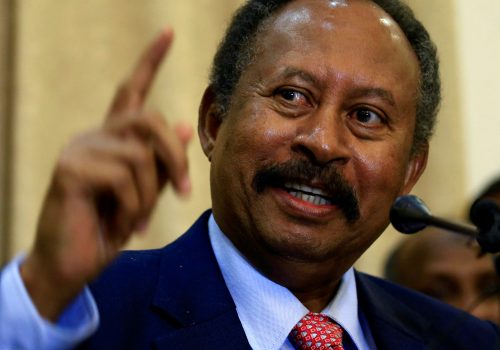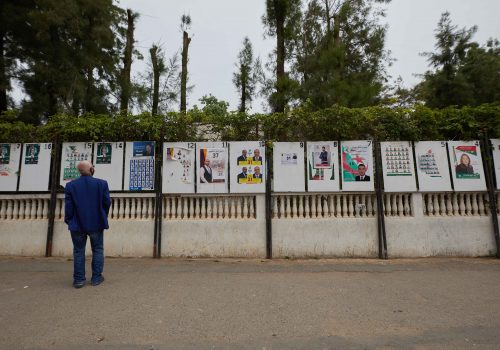The Sudanese Bar Association drafted a transitional constitution. How can it be improved?
Following the recent declaration on July 4 by the Sudanese military leadership that it would accept the establishment of a civilian government and fully withdraw from politics pending a civilian consensus, the Sudanese Bar Association (SBA) prepared a draft transitional constitution that Sudan’s pro-democracy forces could unite around.
The initiative has been applauded by domestic groups, stakeholders, and the international community. It demonstrates the importance of professional institutions and trade unions in bringing political organizations together and restoring the democratic transformation process. The draft constitution provides that the new transitional government be entirely civilian, thereby avoiding one of the mistakes of the 2019 Constitutional Charter, which established a civilian-military partnership. However, there are key issues that require further discussion and inclusion in the draft constitution.
The transitional constitution, by definition, is intended to govern the transitional period, during which the government should embark on a proper comprehensive, inclusive, transparent, and participatory constitution-making process to construct a permanent and democratic constitution. The current SBA constitution-production process does not, in any event, substitute the proper democratic constitution-making process that the transitional government should organize.
The most important point that the constitution drafters and reviewers should consider is that any re-established transitional period should not be a conventional transitional period. Rather, it is a foundational transitional period that should address as many fundamental problems of Sudan as possible. Historically speaking, during transitional periods, caretaker governments have only been empowered to organize elections and run the country in the interim, before handing power over to the party or parties that won the elections. Similarly, the discussion of the fundamental problems of the Sudanese state, such as the relationship between state and religion, language policies, and the constitutional relationship between the central government and the peripheries, has been pushed back to the post-transitional period.
However, experiences of other African nations—such as Ethiopia and South Africa—demonstrate that addressing these issues during the transition contributes to laying the foundations for democracy, peace, and stability. Learning from their experiences, conventional Sudanese political organizations, which tend to be politically conservative, should, therefore, not be allowed to make Sudan’s next transitional period another failure in the political and constitutional history of the country.
What a draft constitution must entail
Another equally important point is the need for the draft constitution to reasonably address and rectify the shortcomings of the previous transitional period, which had partially resulted from the deficiencies of the 2019 Constitutional Charter. A clear example was the charter’s silence on the powers of the state or regional governments and their relationship with the central government; this proved to be extremely problematic, as neither level had clear limitations on the powers they exercised, creating confusion and tensions between them.
It seems that the SBA draft constitution has not learned from the 2019 charter in this regard, as it also fails to mention this significant distribution of powers. This exclusion is particularly perplexing given that the SBA explicitly establishes a federal state in which the exclusive and concurrent powers of the federal and state or regional units should be expressly set out.
The draft constitution should contain a detailed article on citizenship, which is the indispensable foundation of any modern democratic state. For a nation that has been destabilized and embroiled in civil wars because of ethnic and religious dichotomies, enshrining universal citizenship principles and rules in the transitional constitution would be a necessary indication that the ethnic, religious, cultural, and regional policies that have fragmented the Sudanese nation and caused the deterioration of the state have no place in Sudan.
Relatedly, the article on the nature of the state should provide for establishing an impartial state that does not adopt a religious, ethnic, cultural, or regional identity. The drafters and reviewers of the new transitional constitution should consider the historical demands of the Sudan People’s Liberation Movement, led by Abdulaziz Alhilu, calling for the separation of state and religion. In this regard, the progress made during the transitional period, namely, the signing of a declaration of principles that separated the state from religion, should be reflected in and reaffirmed by the draft constitution.
Finally, the draft constitution should not overlook the linguistic diversity of the country—both ensuring that ethnic groups have the right to use their vernacular languages and dedicating a separate foundational article that conspicuously recognizes the right of state and regional governments to adopt a vernacular language as a working or official language. It should recognize the right of any state or region to adopt such a language as the language of instruction in its local schools.
In this regard, Sudan should learn from the Malaysian experiment, where the use of vernacular languages is constitutionally recognized, while at the same time promoting English and Malay as linguae francas and mediums of instruction in higher education institutions. To support these efforts, the draft constitution should establish a board, similar to that established by the South Africa Constitution, to ensure the continuous promotion of the use of vernacular languages as well as its development.
Technocratic government
The experience of the second government (February 2021-October 2021) during the previous transitional period (August 2019-October 2021) indicated that the participation of political parties in the government would spark unnecessary, paralyzing political differences and conflicts. It is, therefore, important that the draft constitution unequivocally provide that the transitional government be technocratic. That is the only way to avoid the repetition of the political differences and conflicts that the transitional governments witnessed in the months that preceded the October 25, 2021 coup, which would have probably been impossible had those differences and conflicts not existed.
The SBA draft constitution provides that political forces sign the political declaration, according to which the draft constitution shall be adopted, and nominate individuals for the senior positions of prime minister, Sovereignty Council member, and cabinet roles, among others. The draft constitution, surprisingly, goes as far as enabling those forces to nominate and appoint the members of the independent commissions, chief justice, president, members of the Constitutional Court, and judges of the Supreme Court.
Vesting the power to nominate the prime minister and members of the Sovereignty Council in the political forces that sign the political declaration will, undoubtedly, ignite deep and irreconcilable political differences that might make the establishment of the transitional government impossible. Furthermore, the nomination of the members of the independent commissions, the chief justice, the president and members of the Constitutional Court, and the judges of the Supreme Court is obviously incompatible with the principles of democracy, as well as the independence of these institutions and positions.
To avoid political differences or impossibility of agreement between the Central Committee of the Forces for Freedom and Change and other political groups, and to ensure the independence of the institutions that should be independent in a democratic and open society, the draft constitution should consider creating independent and impartial mechanisms, such as a committee or council of wise persons, that will have the power to select the prime minister and nominate individuals for the other high constitutional positions.
More significantly, providing for a federal system without constitutionally enshrining the detailed exclusive and concurrent powers of each level or unit of the federal union undermines the very idea of federalism. It is, therefore, extremely important that the draft constitution contain three comprehensive lists of exclusive and concurrent powers of the federal and regional or state governments: one for the federal government (exclusive federal powers); a second for the state or regional governments (exclusive state or regional powers); and a third for both levels of government (concurrent powers).
Finally, the Bill of Rights of the draft transitional constitution, which is, in fact, taken almost verbatim from the 2005 Interim Constitution and the 2019 Constitutional Charter, should be more elaborate and comprehensive, explicitly providing for the procedures and principles that ensure the actual protection of human rights and fundamental freedoms by state institutions, especially the Constitutional Court and Supreme Court. It should also empower lower courts across the country to admit and decide human rights cases in some specific situations, as is the case in the United States.
In this regard, an alternative comprehensive and detailed new bill of rights, ideally based on and adapted from the 2010 Kenyan Constitution Bill of Rights, should seriously be considered by the Sudanese Bar Association or the reviewers of its draft constitution. The Kenyan Constitution’s Bill of Rights is one of the most comprehensive and elaborate bills of rights on the African continent.
In essence, the initiative undertaken by the Sudanese Bar Association and its production of a draft constitution has created robust political momentum. Additionally, it has created real possibility for uniting pro-democracy forces at a critical point in history—something that would put the pro-democracy civilian camp in a strong position to establish an entirely civilian government.
For this draft constitution to be a solid foundation for a new democratic transformation process, its provisions should be based on an important assumption that the transitional period is a foundational period and not merely conventional transitional period, where a caretaker government runs the state and organizes elections within a year or so. The resolution of some of Sudan’s historical problems—such as the relationship between state and religion, addressing its diversity management issues, and rectifying the deficiencies and shortcomings of the previous transitional period and those of the 2019 Constitutional Charter—should be genuinely considered as much as possible by the SBA draft constitution.
Nasredeen Abdulbari is a nonresident senior fellow with the Atlantic Council’s Middle East Programs. He is Sudan’s former justice minister.
Mutasim Ali is a legal advisor at the Raoul Wellenberg Center for Human Rights, based in Washington, DC.
Further reading
Tue, Aug 23, 2022
Middle Eastern nations should learn from history and back Sudan’s democratic forces
MENASource By
The Middle Eastern countries that are interested in establishing political relations with Sudan, such as Israel, and those that are interested in investing, such as Saudi Arabia and the UAE, should stand on the side of pro-democracy civilian forces.
Fri, Nov 19, 2021
Deputy assistant secretary of state for North Africa: The best way to counter corruption is to strengthen democracy
Event Recap By
On October 27, the Atlantic Council’s North Africa Initiative hosted an event with the Italian Institute for International Political Studies (ISPI), discussing the implications of current political, socio-economic conditions and future challenges North Africa faces.
Thu, Jun 3, 2021
Algeria’s parliamentary elections: A bumpy road ahead
MENASource By
While the coronavirus pandemic put on hold the Hirak movement, its resumption in February this year indicates that many Algerians have not renounced challenging the Algerian government.


